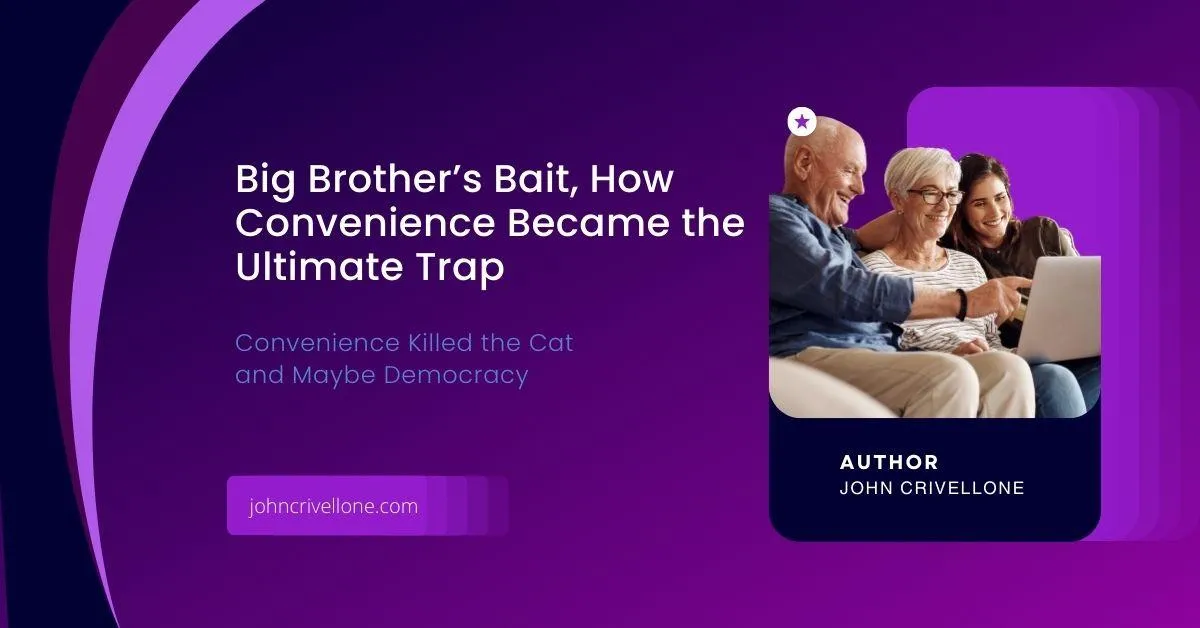
Big Brother’s Bait: How Convenience Became the Ultimate Trap
You didn’t trade your privacy in a grand courtroom deal. You gave it away one download at a time—for speed, simplicity, and so-called safety. You tapped “Accept All Cookies,” installed another “smart” app, and let your devices track you from your coffee stop to your bedroom light switch. Why? Because it was easy. And that, my friend, is exactly the point.
In this second installment of our exposé blog series—based on my book Big Brother Is Watching—we’ll break down how convenience became the soft velvet leash of the surveillance age. It’s not that we were tricked with tanks or troops. We were baited with free Wi-Fi, one-tap ordering, and talking thermostats. And now? We’re the product.
Convenience Is the Trojan Horse
Remember when shopping used to take effort? When you drove to a store, looked someone in the eye, and paid in cash? Now, Amazon knows what you’ll buy next week. Google Maps knows when you’ll leave the house. Uber knows who you meet. Alexa knows how often you use the bathroom. Every single service built to “help” you is also harvesting you.
And here’s the kicker: you gave it permission.
We didn’t just accept the terms and conditions. We normalized them. We turned privacy invasion into a cultural joke—like laughing about your phone "listening" after you mention needing new tires. Funny? Maybe. But what’s not funny is how all this data is used to shape, limit, and predict your choices.
Data Dictatorship: When Algorithms Become Authority
It used to be that power came from guns, gold, or governing. Now it comes from data. The more they know about you, the more they can:
Control what ads you see (and suppress the ones you don’t)
Predict what you’ll buy, say, even vote
Penalize you without trial through shadow bans, digital red flags, or financial "deplatforming"
Sound extreme? Ask Canadian truckers who lost banking access during protests. Ask small creators deplatformed without cause. We’ve reached a point where data isn't just used to sell you things—it’s used to silence and sort you.
Safety vs. Freedom: A False Trade
Governments and tech firms want you to believe it’s all for your protection. That surveillance stops terrorism. That data tracking makes life easier. That giving up a little liberty is just the price of progress.
But that’s a lie. Real safety doesn’t come from control—it comes from trust and truth. And if someone has to monitor your every move to keep you safe, then you’re not safe at all. You’re managed.
Smart Tech, Dumb Freedom
They call it a smart home. I call it a dumb trap.
Smart TVs, smart fridges, smart cars—each one collects data on your routines, conversations, and habits. Even your Ring doorbell doesn’t just protect you. It uploads footage to the cloud, sometimes accessed by law enforcement without a warrant. So when does convenience become complicity?
When we stop questioning it.
The Psychology of Compliance: Why We Let It Happen
Here’s the real brain bomb: it’s not that we’re lazy. It’s that we’re conditioned.
Apps are designed to addict. Interfaces are created to pacify. And systems are built to reward ease over autonomy. Every time you click instead of question, you’re reinforcing the system that benefits from your silence.
And it’s not just personal. It’s political. When enough people choose comfort over confrontation, tyranny doesn’t need to march in. It gets invited.
What You Can Do (Before It’s Too Late)
Look, I’m not here to shame you. I use a smartphone too. I’ve got emails to check, bills to pay, and yeah, even Alexa has said my name once or twice. But we can do something about it:
Audit Your Devices – Go through your phone and smart tech. What’s on? What’s tracking you? What permissions have you given up?
Stop Over-Sharing – Your kids don’t need their life broadcast. Your dinner doesn’t need GPS tagging. Your posts don’t need timestamps.
Support Digital Rights Groups – Organizations like EFF (Electronic Frontier Foundation) and Fight for the Future are on the front lines.
Talk About It – Make privacy part of your dinner conversation. Once people see it, they can’t unsee it.
Say No – You don’t have to scan a QR code for a sandwich. You don’t need to join every loyalty program. Sometimes saying no is the most radical act.
Final Word: Convenience Killed the Cat—and Maybe Democracy
Convenience is seductive. That’s why it works. But what starts as a shortcut can quickly become a noose.
We must stop treating ease as harmless and start treating privacy as precious. Because once freedom dies in the name of comfort, getting it back won’t be as easy as clicking "Accept."
This is Jack Crivalle, still watching the watchers—and hoping you are too.
Next Week: “Compliance Theater: How Safety Culture Is Breeding a Nation of Rule Followers”
Subscribe to the blog and share with someone who still thinks their phone isn’t listening.